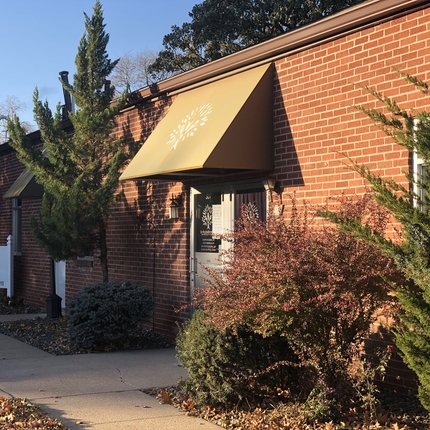Kristi Eggers was raised rural, and has always loved helping others. Little did she know those two aspects of her life would forge a lifelong career and passion for rural health care.
Born and raised in Oklahoma, Kristi’s love of rural began on the farm where she grew up. As a teenager, Kristi volunteered after school each day as a candy striper at her local hospital, a position which sparked her interest in the medical field.
Her path down the road of medicine led Kristi to first become a licensed practical nurse (LPN), then a registered nurse (RN). After a few years working in the field, she went to school in pursuit of her bachelor’s degree in nursing. Time spent as an emergency room, intensive care, and obstetrics nurse gave her the push she needed to pursue her master’s degree and nurse practitioner certification, which she obtained in 2005.
At that time, Kristi and her family came to Sutton, Nebraska, for a taste of small-town family living.
Sutton had no hospital then, but had hosted a medical clinic for many years. Through a joint collaboration between the Economic Development Corporation of Sutton, the Sutton City Council, and the CEO of Mary Lanning Memorial Hospital, a deal was struck to bring a branch of that hospital to the town in the form of a clinic.
Kristi was brought on as the main health care provider for the operation, with a requirement that she live in the town of Sutton as part of the collaboration. Though she was excited for the opportunity, she says things started off slow.
“For the first several months, I would see two patients a day on average,” said Kristi. “The community had migrated elsewhere for health care because there wasn’t anything steady here. So, the town just watched for awhile—they wanted to see if I’d become part of the community.”
Over the years, Kristi became more than just part of the community—she became a beloved fixture in the town of Sutton. Developments led to a change in clinic ownership, and Kristi has now operated her own private practice, Quality Healthcare Clinic, for several years.
“In 2012, we were the same team, same crew [from the previous clinic], but totally private,” said Kristi. “There were a lot of politics involved in the changeover, which took a long time to get over, but now it’s turned into this really beautiful thing—when you're private practice, you can offer your patients a lot of different options.”
Included in those options are house calls. Kristi travels to her patients when necessary, a service residents greatly appreciate.
“I strongly believe you take care of patients first and everything else will fall in line,” said Kristi. “I think that’s how you should practice medicine. So, we go to the patients when they can’t come to us. I prefer it that way because you can see a patient in their own environment.”
Upgrades to the building Quality Healthcare Clinic calls home has led to a shared lobby with an area Kristi’s team converted into an independent specialty clinic.
“We now have eight specialities come in, including cardiology, orthopedics, pain management, dermatology, and podiatry,” said Kristi. “Their schedules are full, so it has really turned out to be something beautiful. Patients are getting comprehensive care they wouldn’t have gotten before because they wouldn’t drive to get it or they couldn’t afford to go get it.”
Along with general care, Kristi is proud that Quality Healthcare Clinic offers mental health services.
“It’s a huge problem in this area—there's not enough mental health care, so we recognized that need, and we are actually the only place in Clay County where you can get licensed therapy services,” Kristi said. “Unfortunately, that is not financially productive, so other providers don’t want to do it. But, it has been a very successful venture as far meeting patients’ needs.”
Finances often come into play for small-town clinics. Kristi says one of the hardest parts of running a private practice in a rural community is staying financially afloat, especially with much of the town’s aging population utilizing Medicare or Medicaid.
“Medicare and Medicaid can be difficult,” she said. “You cannot negotiate those prices. You either take it or you don’t. With an older population in town, we really have no choice but to take Medicare.”
According to Kristi, some health care entities in larger cities have stopped taking Medicare/Medicaid, because they can afford to get by without it, whereas in smaller towns, like Sutton, that’s not an option.
“People are not going to get care at all [if we don’t take Medicare/Medicaid], and I’m not willing to let that happen,” she said. “It makes it harder to survive, because the money in health care is not in seeing patients, it’s in the procedures, surgeries, scans, etc. When you’re just a small clinic, it’s really difficult to make it financially in this world.”
Even with those concerns, Kristi says it’s her top priority to work with patients so they can get the services they need.
“Medicare has now started paying for some preventive programs which is helpful for us, because we have always advocated that prevention is best if possible,” said Kristi. “We always reached out to make sure patients were doing okay before, but now it’s paid for. Medicare has made some big advances in that area.”
Though it’s financially difficult to maintain a small-town clinic, Kristi has big plans for the future of health care in Sutton, and keeps pushing forward to reach her goals.
“I want to see more specialties come in—that would be key,” she said. “At some point, it’d be really nice to see all of us conglomerate together. I have a vision of chiropractic and physical therapy and pharmacy all being in the same medical complex so we can support each other instead of being all scattered out.”
Kristi feels the cooperation and support between service providers is necessary for them all to survive in a small town.
“If any one of us doesn’t survive, it affects the other ones,” she said. “The more we can keep here, the healthier our community can be. Plus, it gives the patients a choice. This community wants to support the community.”
That support and love of her community is why Kristi thinks it’s important to keep working toward her goal.
“I don’t think the world realizes when somebody lives 10 miles out in the country and they’re elderly, it’s easier not to get care than to try to travel to find it,” she said. “Having these services available to these people is so important.”
Above all else, Kristi believes proper patient care and rural living can not only successfully co-exist, but also harmoniously thrive with the hard work, dedication, and the right outlook.
“I know my patients very well—I can look at them and say something isn’t right today, versus them showing up a hospital and the staff there not knowing them from Adam,” she said. “I do think they get better care here, and I don’t mind saying that. We take the extra time to do things right. You go to church with these people, you shop with these people, so sometimes it’s hard because you don’t get to deliver great news, but it is a great place to be.”





